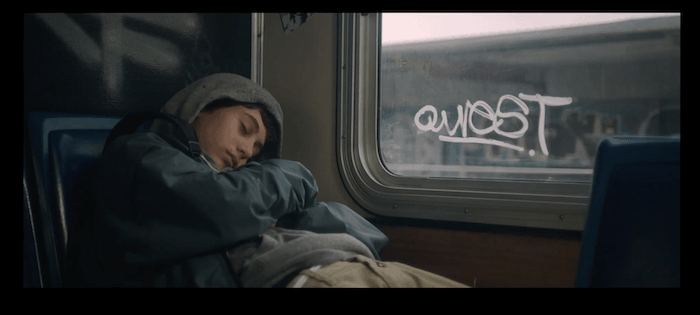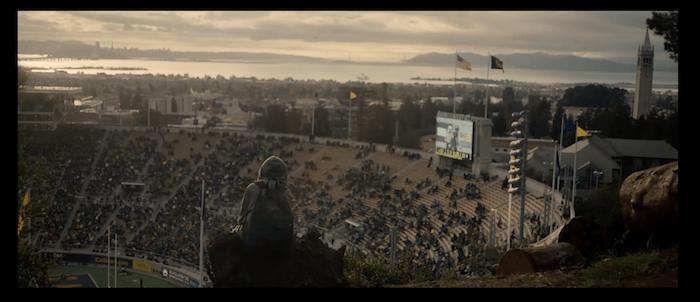
DIRECTED by: Santiago Rizzo
If there is one thing that Santiago Rizzo’s directorial debut unequivocally gets across to his audience is how sincere, in the roles of director and storyteller, he can be. Quest is the true-to-life story of his mentor, Tim Moellering, whose kindness, we are told, plucked Rizzo (Mills in the film) from a path of assured destruction on the streets of Berkeley, California, and a broken home and set him straight through his integrity and unwillingness to give up on him.
While the saintly elementary teacher salvaging the potential of a wayward inner-city youth only he can see is, narrative wise, weathered and predictable ground, there is no detectable pretense in how Rizzo sells you on his personal redemption. He clearly thinks the world of Moellering and wants his film to serve as an ode to his teacher’s memory and as inspiration, and this earnestness plays for better or for worse.
At the formative age of 12, Rizzo’s counterpart, Mills, is directionless, with his only outlet away from the abusive confines of his stepfather’s home (a surprisingly menacing Lou Diamond Phillips) and the oppressive administration of his primary school is the illegal creative expression of graffiti. His considerable talent no doubt declarative of how many nights he has spent on his lonesome, he finds a street mentor in Diego (Lakeith Stanfield) whose message of resilience in the face of struggle resonate with Mills despite not seeing any result on Diego’s part.

Together they tag and wax poetic weekly about their societal situation (“…man, you don’t go to jail for selling cigarettes that cause cancer, but you will for beautifying the city…”), and all signs point to Mills being fast-tracked to a dead end in life, especially in the aloof pretentiousness with which Stanfield’s performance material is imbued. There is no hope for furtherance in his situation, wherein relationships with every role model he affixes himself to (be it the delusional Diego or the abusive stepfather, Gus) lead to nowhere, so he is prime for the rescue from the straight-talking humanist in Tim Moellering.
It’s at this moment when the conventions that Rizzo is working from, even if they are true to life, become highly noticeable, and his sincerity gives way to predictability. The pattern of Tim gradually ingratiating himself to the wayward youth, as to make him believe once more in the integrity of adulthood, follows a highly contrived and unfortunately familiar schema that obstructs his attempts to be genuine. As the football coach (Dash Mihok, who was also co-screenwriter before his passing), Tim’s a no-nonsense, benevolent figure who goes out of his way to demonstrate kindness to a kid who has never known it before, and this feeling is returned in how obstinately affectionate Rizzo’s portrayal of him is.
Even if this treatment is capable of being touching in how genuine it is, the debuting director relies too heavily on tropes of past “saintly teacher” molds in his writing to have complete assurance of his veracity. Certain moments, such as Moellering taping up Mills’ discarded essay for him or giving him his personal phone number on the same day that Mills is arrested, speak to a director who is still finding his way around storytelling.
Rizzo’s status as a directorial neophyte makes itself apparent in his penchant for overly literal metaphors that, conceptually, seem loaded but, in practice, are cumbersome and distracting from what he dramatizes. Nothing is too on the nose for Rizzo, be it Stanfield’s street-mentor character hiding his stash of weed in a hollowed-out copy of John A. Garraty’s The Story of America or having one of Mills’ thrashings at the hands of his stepfather be juxtaposed with an episode of Leave it to Beaver on a neglected television in the corner as to ensure we know how far our hero is from the idealized home of past Americana.

The titular tag itself, which Mills pathologically scrawls on every available surface, is overly indicative of his journey as a character back into self-worth and back into the vestiges of (what can be called) respectable society. Rizzo as director comes across eager and ambitious, but his needless employment of cheap, pronounced symbolism sells the gritty fidelity of his story short.
Near the end of his quest, when Mills has had an abrupt epiphanic moment about the dangers his aimless life on the California streets can pose, he runs away to nowhere in particular in what seems to be a deliberate nod to Truffaut’s The 400 Blows. Reaching out to that particular masterpiece doesn’t do Rizzo’s own attempt to relate youthful isolation and aimlessness any favors because, once more, he becomes overly contrived and forceful with his messaging.
Mills’ desperate, futile sprint from the self-destructive surroundings he’s cultivated leads him to a literal dead-end street that prominently features two school buses on each side of the blocking, both coincidentally spay-painted. A tableau such as this sticks out uncomfortably in what is meant to be a dramatic climax, butting in with a demand to be interpreted in the singular way the director has allowed. It is such a common film-school mindset that I was genuinely surprised to read Rizzo never attended any of these numerous institutions offered in his native California.
Thankfully the issues with Quest as a first effort for Rizzo do not hold back his ability to be emotionally effective because he unapologetically wears his heart on his sleeve. Either from the often strikingly intimate handheld shots or his script, which bleeds unfiltered affection for his characters and the night-soaked streets of Berkeley, Quest is uncomplicated humanism that plays equally to the people at the front row as well as those at the back of theater.
This incessant picking apart of Rizzo as director is only because his significant talent is so apparent in his first foray behind the camera, and perhaps, if he could work with material that he wasn’t so intimate with and thus able to be more critically reflective, that talent might well have been much more prominently displayed.






